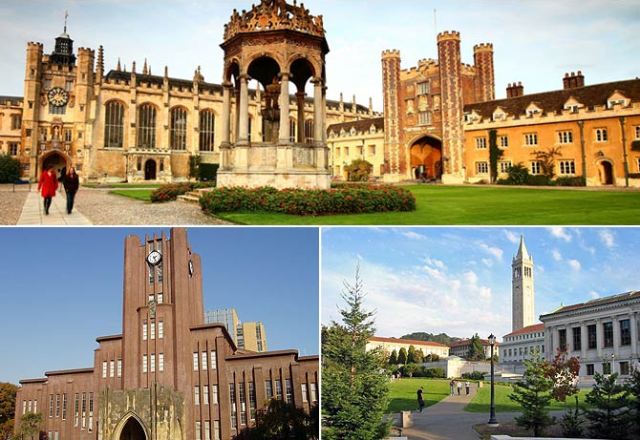In 2025, the global higher education landscape continues to be shaped by institutions renowned for their academic excellence, research innovation, and global influence. Rankings such as the QS World University Rankings and the Times Higher Education (THE) World University Rankings serve as comprehensive assessments, offering valuable insights for prospective students, educators, and policymakers. These rankings evaluate universities based on various performance metrics, including academic reputation, research output, faculty quality, and international outlook.
Key Takeaways
- MIT remains the world’s leading university in the QS rankings, continuing its legacy in technology and innovation.
- Oxford tops the Times Higher Education (THE) rankings, showcasing excellence in research and teaching.
- Imperial College London and NUS are standout performers in 2025, reflecting the global diversification of elite education.
- U.S. and U.K. universities dominate the top 10 lists, but Asia and Europe are closing the gap quickly.
- Methodologies vary: QS emphasizes academic reputation and employer insights; THE prioritizes teaching, research, and citations.
- Fields of strength differ by institution: Engineering and sciences at MIT and Caltech; Humanities and Social Sciences at Harvard and Oxford.
- Globalization and innovation continue to shape the future of higher education, making it more accessible, interdisciplinary, and student-centered.
QS World University Rankings 2025: Top Universities
Massachusetts Institute of Technology (MIT), USA
Founded in 1861, the Massachusetts Institute of Technology (MIT) is globally recognized as a pioneer in science, technology, engineering, and mathematics (STEM) education. Located in Cambridge, Massachusetts, MIT’s mission centers on advancing knowledge and educating students in science, technology, and other areas that will best serve the nation and the world.
Academic Excellence and Research Leadership
MIT consistently ranks as the world’s top university in many global rankings, notably securing the number one spot in the QS World University Rankings for over a decade. This reputation stems from MIT’s unmatched contributions to research, innovation, and entrepreneurship.
The institution is home to cutting-edge research across disciplines such as artificial intelligence, robotics, biotechnology, computer science, aerospace engineering, and environmental science. Its interdisciplinary approach encourages collaboration between departments, enabling breakthroughs that have global impact.
Faculty and Student Body
MIT boasts a faculty comprising Nobel laureates, Turing Award winners, MacArthur Fellows, and members of prestigious national academies. This elite group of scholars provides students with mentorship, fostering a culture of academic rigor and creativity.
The student body is equally impressive—highly selective and diverse, attracting top talent from around the globe. MIT’s undergraduate and graduate programs emphasize hands-on learning and problem-solving skills, often through labs, projects, and entrepreneurial ventures.
Innovation and Entrepreneurship
MIT’s ecosystem supports one of the most vibrant innovation hubs in the world. The institution has incubated thousands of startups, many of which have grown into major technology companies. MIT alumni have founded influential organizations like Dropbox, Bose Corporation, and Qualcomm.
The Martin Trust Center for MIT Entrepreneurship and MIT Innovation Initiative provide resources and mentorship for aspiring entrepreneurs. This strong entrepreneurial culture makes MIT a magnet for students interested not only in academic theory but also in real-world applications.
Campus and Facilities
MIT’s sprawling campus combines state-of-the-art research labs, collaborative workspaces, and facilities dedicated to innovation and learning. The university invests heavily in infrastructure that supports cutting-edge research, such as the Koch Institute for Integrative Cancer Research and the MIT Media Lab.
Global Influence and Collaborations
MIT’s influence transcends borders through partnerships with governments, industry leaders, and academic institutions worldwide. Its commitment to addressing global challenges—such as climate change, energy sustainability, and public health—positions it as a leader in international research collaborations.
Notable Alumni and Contributions
MIT alumni have made profound impacts across sectors, from technology and business to government and academia. Some famous graduates include:
- Kofi Annan – Former UN Secretary-General and Nobel Peace Prize laureate
- Richard Feynman – Theoretical physicist and Nobel Prize winner
- Ilene S. Gordon – Former CEO of Ingredion Incorporated
- Drew Houston – Co-founder and CEO of Dropbox
Academic Programs
MIT offers a broad array of programs through its five schools: School of Engineering, School of Science, Sloan School of Management, School of Architecture and Planning, and School of Humanities, Arts, and Social Sciences. This diversity enables students to pursue interdisciplinary education, combining technical knowledge with leadership and communication skills
Imperial College London, UK
Founded in 1907, Imperial College London has rapidly risen to become one of the world’s leading universities, especially renowned for its focus on science, engineering, medicine, and business. Situated in the heart of London, Imperial blends a rich tradition of academic excellence with a cutting-edge research environment, making it a top choice for students and researchers worldwide.
Academic Excellence and Research Innovation

Imperial consistently ranks among the top universities globally, securing the second place in the QS World University Rankings 2025 and maintaining a strong presence in other key international rankings. The university’s reputation is built on its rigorous academic programs and impactful research output, particularly in STEM fields.
Imperial’s research spans across various domains, including:
- Biomedical engineering and healthcare innovation
- Climate change and sustainability
- Artificial intelligence and data science
- Advanced materials and nanotechnology
- Energy technologies and environmental sciences
Imperial’s research is known not only for its academic depth but also for its practical applications, often influencing public policy and industry standards.
Faculty and Student Community
Imperial boasts a world-class faculty composed of leading scientists, engineers, and scholars, many of whom are fellows of prestigious academies like the Royal Society. The university attracts a highly diverse and talented student population, with over 60% of students coming from outside the UK, fostering a vibrant international community.
Imperial emphasizes a collaborative and interdisciplinary learning environment, encouraging students to engage with real-world challenges through projects, internships, and partnerships with industry leaders.
Strong Industry Links and Innovation Ecosystem
Imperial’s location in London provides unparalleled access to a global financial and technological hub. The university maintains close ties with industries ranging from healthcare to finance and engineering, facilitating internships, collaborative research, and entrepreneurial ventures.
The Imperial College Innovation Hub supports startups and spin-offs, providing mentorship, funding, and workspace to student and faculty entrepreneurs. Imperial has a proven track record of translating research discoveries into commercial ventures, contributing significantly to the UK’s innovation landscape.
Campus and Facilities
Imperial’s main campus in South Kensington is home to modern laboratories, lecture halls, and collaborative spaces designed to foster innovation and learning. Recent investments have enhanced the campus with cutting-edge research centers such as the Imperial College Business School, Institute of Global Health Innovation, and the Grantham Institute for Climate Change and Environment.
The university’s facilities support a broad range of activities from high-tech biomedical research to AI development and sustainability projects.
Global Outlook and Partnerships
Imperial College London actively engages in global collaborations with top-tier universities, research institutions, and industry partners. Its research on global health, sustainable energy, and climate science positions the university as a key player in addressing some of the world’s most urgent challenges.
Additionally, Imperial offers numerous exchange programs and joint degrees, providing students with international exposure and diverse academic experiences.
Notable Alumni and Achievements
Imperial’s alumni network includes influential leaders in science, business, and government. Some notable alumni include:
- Alexander Fleming – Discoverer of penicillin and Nobel Prize laureate
- Sir Roger Bannister – The first person to run a mile in under four minutes
- Brian May – Astrophysicist and guitarist of the band Queen
- Shriti Vadera – Chairwoman of Santander UK and influential business leader
These individuals reflect Imperial’s tradition of producing pioneering minds who contribute significantly to society.
Academic Programs
Imperial offers a broad range of undergraduate and postgraduate programs through its faculties:
- Faculty of Engineering
- Faculty of Medicine
- Faculty of Natural Sciences
- Imperial College Business School
Students benefit from a curriculum that integrates theoretical foundations with practical applications, preparing graduates to excel in research, industry, and entrepreneurship.
Commitment to Sustainability and Social Impact
Imperial College London is deeply committed to sustainability, with significant investments in climate research and environmental initiatives. The university aims to achieve carbon neutrality and integrates sustainability principles across its research and teaching.
Its social impact is also visible in community engagement programs, public health projects, and global development partnerships, reinforcing Imperial’s role as a socially responsible institution.
University of Oxford, UK
A stalwart in global education, Oxford offers a diverse range of programs and boasts a rich history of academic achievement. Its rigorous selection process and esteemed faculty contribute to its top-tier status.
Harvard University, USA
Harvard remains a beacon of academic excellence, with strengths across various disciplines, including law, business, and the humanities. Its extensive resources and influential alumni network bolster its global reputation.
University of Cambridge, UK

Cambridge’s commitment to research and its collaborative environment foster innovation and scholarly pursuits. The university’s rich academic heritage continues to attract top talent worldwide.
Stanford University, USA
Situated in the heart of Silicon Valley, Stanford is at the forefront of technological advancements and entrepreneurial endeavors. Its close ties to the tech industry enhance its research capabilities and global influence.
Times Higher Education (THE) World University Rankings 2025: Top 10 Universities
The Times Higher Education World University Rankings 2025 presents a slightly different perspective on global university standings:
University of Oxford, UK
Oxford retains its position as the top university globally, excelling in teaching, research, and international outlook.
Massachusetts Institute of Technology (MIT), USA
MIT ranks second, reflecting its strong performance in research and teaching.
Harvard University, USA
Harvard holds the third spot, with notable achievements in research and teaching quality.
Princeton University, USA
Climbing to fourth place, Princeton is recognized for its research output and teaching excellence.
University of Cambridge, UK
Cambridge maintains its position in the top five, with strengths in research and teaching.
Stanford University, USA
Stanford ranks sixth, reflecting its research capabilities and teaching quality.
California Institute of Technology (Caltech), USA
Caltech holds the seventh spot, excelling in research and teaching.
University of California, Berkeley (UCB), USA
UCB ranks eighth, with strong performance in research and teaching.
Imperial College London, UK
Imperial College London is ranked ninth, recognized for its research and teaching.
Yale University, USA
Founded in 1701, Yale University is one of the oldest and most prestigious institutions of higher learning in the United States. Located in New Haven, Connecticut, Yale is internationally renowned for its strong liberal arts foundation, world-class faculty, and vibrant campus community. It offers a unique blend of traditional academic excellence and modern research innovation.
Academic Excellence and Research Strength
Yale consistently ranks among the top universities worldwide and is particularly noted for its strengths across a wide spectrum of disciplines including the humanities, social sciences, law, medicine, and the arts, alongside STEM fields. Yale’s commitment to interdisciplinary scholarship fosters innovation that bridges traditional academic boundaries.
The university’s research output is substantial, with significant contributions to fields such as:
- Medicine and biomedical sciences
- Environmental studies and sustainability
- Political science and international relations
- History, literature, and cultural studies
- Engineering and applied sciences
Yale is also home to numerous renowned research centers such as the Yale School of Medicine, Yale Law School, and the Yale Center for Emotional Intelligence, making it a hub for impactful scholarship and societal contribution.
Faculty and Student Community
Yale’s faculty includes numerous Nobel laureates, Pulitzer Prize winners, MacArthur Fellows, and members of prestigious academies. This distinguished faculty provides mentorship and fosters a learning environment that promotes critical thinking, creativity, and academic rigor.
The student body at Yale is highly selective and diverse, with students coming from all 50 U.S. states and over 120 countries worldwide. Yale emphasizes a residential college system, which fosters close-knit communities that combine academic, social, and extracurricular life, creating a supportive environment for personal and intellectual growth.
Campus Life and Facilities
Yale’s historic campus blends classic Gothic architecture with modern facilities. The university offers state-of-the-art libraries such as the Sterling Memorial Library, research laboratories, and extensive arts facilities including theaters, museums, and galleries.
The residential college system is a defining feature of Yale’s student life, with 14 residential colleges each providing unique identities, traditions, and support systems. This system enhances community bonding and gives students a sense of belonging throughout their academic journey.
Global Influence and Partnerships
Yale maintains a global presence through extensive international collaborations, research partnerships, and study abroad programs. Its focus on global challenges such as public health, climate change, and human rights underscores its commitment to making a worldwide impact.
The Yale World Fellows Program attracts emerging leaders from around the globe, further enriching the university’s international network and fostering cross-cultural dialogue.
Notable Alumni and Contributions
Yale boasts an impressive list of alumni who have made significant contributions in various fields:
- Hillary Clinton – Former U.S. Secretary of State and presidential candidate
- Sonia Sotomayor – Associate Justice of the U.S. Supreme Court
- Meryl Streep – Acclaimed actress and multiple Academy Award winner
- Fareed Zakaria – Journalist, author, and political commentator
These distinguished individuals reflect Yale’s broad influence on politics, law, culture, and media.
Academic Programs
Yale offers a comprehensive range of undergraduate, graduate, and professional programs through its 14 schools, including:
- Yale College (undergraduate liberal arts education)
- Yale Law School
- Yale School of Medicine
- Yale School of Management
- Yale School of Architecture
Yale’s curriculum encourages interdisciplinary study, critical inquiry, and experiential learning, equipping students to become leaders and innovators in their fields.
Commitment to Diversity and Inclusion
Yale is deeply committed to fostering an inclusive and equitable community. The university has implemented numerous initiatives aimed at increasing diversity among students and faculty, supporting underrepresented groups, and promoting dialogue around social Justice issues.
Also Read : What Jobs Can You Get with a Business Degree Today?
Conclusion
The global higher education landscape in 2025 reflects both tradition and innovation. While legendary institutions like MIT, Harvard, Oxford, and Cambridge maintain their historic dominance, new contenders and rising universities—especially in Asia and Europe—are making remarkable strides in global rankings. These rankings are shaped by a range of performance indicators, including research output, teaching quality, employability, and international outlook.
Choosing a top university depends not only on prestige but also on alignment with personal goals, academic interests, and career ambitions. With higher education becoming increasingly globalized, many students now prioritize factors like diversity, interdisciplinary programs, sustainability initiatives, and industry collaboration over rankings alone.
Whether you’re aiming to study artificial intelligence at Stanford, biomedical engineering at Imperial, or public policy at NUS, the world’s leading universities offer rich opportunities to shape your future and contribute meaningfully to society.
FAQs
1. How are the top universities in the world ranked?
Top universities are ranked based on a variety of criteria including academic reputation, research output, faculty qualifications, student-to-faculty ratio, employer reputation, citations per faculty, international student and staff ratios, and teaching quality. Different ranking organizations like QS and Times Higher Education (THE) weigh these factors differently.
2. Which countries have the most top-ranked universities?
The United States and the United Kingdom dominate the global university rankings, hosting many of the world’s best institutions. However, countries like Singapore, Switzerland, Australia, Canada, and China are rapidly expanding their presence in global rankings as well.
3. What is the difference between QS and Times Higher Education rankings?
QS rankings focus more on academic reputation, employer reputation, and international diversity. THE rankings put greater emphasis on research volume and impact, teaching environment, and knowledge transfer. Both are respected but provide slightly different perspectives on university quality.
4. Are rankings the only factor to consider when choosing a university?
No. While rankings provide useful benchmarks, students should also consider factors such as specific academic programs, campus culture, location, tuition costs, financial aid opportunities, extracurricular activities, and career services when selecting a university.
5. Can universities outside the U.S. and U.K. compete globally?
Absolutely. Universities in Asia, Europe, and other regions have made significant progress in research quality and global outreach. Institutions like the National University of Singapore (NUS), ETH Zurich, and University of Toronto are excellent examples of world-class universities outside the Anglo-American sphere.
6. How important is research output in university rankings?
Research output is a critical component of most rankings because it reflects a university’s contribution to knowledge, innovation, and academic prestige. Citation counts and research income often play a big role in evaluating research quality.
7. How do universities support career prospects after graduation?
Top universities typically have strong employer networks, career services, internship opportunities, and alumni support systems that help students secure employment after graduation. Employer reputation is also a key factor in rankings, indicating how graduates are perceived in the job market.


